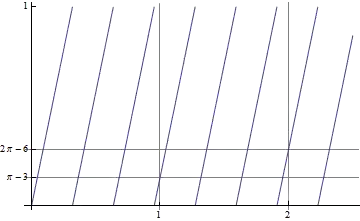Given the following sequence $d(n) = x \cdot n - \lfloor x \cdot n \rfloor$ with $n \in \mathbb{N}$, $x \in \mathbb{R} \backslash \mathbb{Q}$ .
I want to show that for every $z \in [0,1)$ there is a subsequence of $d(n)$ that converges against $z$.
Notes:
I am having serious problems of finding such a subsequence, first I see what the sequence does. If you take for example the subsequence $a(n) = d(10^n)$ you see that it gives you the decimal representation of $x$ starting with the $n'th$ digit. Example: let $x=\pi$, then we get $a(0)=0.141592..., a(1)=0.41592..., a(2)=0.1592...$ and so on.
Also this is a plot of $d(n)$ for $x=\pi$:

You see that for irrational x the height of the function at integers is not constant, nor periodic.
Also this question I asked several weeks ago seems to be related: Proving that an equation is solvable, Floor function